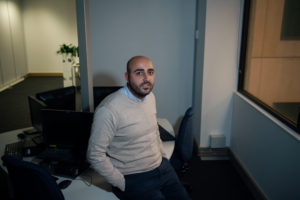Refugee family’s new start
For Firas Chamous, 2019 represents a year of new beginnings.
Having arrived in Australia as a refugee fleeing the conflict in Syria in August 2018, in March of this year Firas began working within his field again as a Computer System Engineer.
“This is my first step to start my life again. You need to start work, earn money. You need to leave the house. It gives you some hope that I am starting my life in here, there is a future,” Firas says.
Now, after being separated from his own family through conflict, he and his wife Rouba have taken another step and strated their own family when Rouba gave birth to a son called Sami.
Like so many others, Firas’ former life in Syria was disrupted by the recent conflict there, which is now the second-deadliest of the 21st century with an estimated death toll of more than 470,000.
Following pro-democratic, popular uprisings calling for the resignation President Assad, the government responded with brutal military action. The protestors, however, didn’t back down, instead organising further into revolutionary militias.
This set the scene for a complex international conflict involving Turkey, Russia, the USA, France and Hezbollah, as well as various other militia groups with an interest in the region, adding to what has become the biggest refugee crisis in history.
In September 2016, the European Union reported that there was 13.5 million refugees in need of assistance of the country.
More specifically, more than 450,000 Syrian Christians were displaced. Firas and his wife were two of them – the newly-married pair forced to flee alone without their families.
“When I was a kid I spent my time with my community at Dom Bosco. It’s a church on Sundays, four or five days a week you can play football, basketball, they had theatres. They provide services for youth. Eight years I spent there with my family and friends,” he said.
“When the war happened… it was a very messy situation. To leave Syria there are two ways. We chose the legal way, whereas some people go through the mountains.
“We drove from Damascus (Firas’ home-city) to Beirut in Lebanon. From there we moved onwards to Iraq,” Firas said.
In Iraq, they struggled.
“In Iraq it was a place to survive. It took me 7-8 months just to get a job, and I couldn’t find anything in my field, so I was working as a retail manager,” Firas said.
From Iraq, their applications for refugee status in Australia were accepted. Once here, Firas went to work creating their new life.
When he arrived, Frias became a client of migrant and refugee settlement agency AMES Australia.
“I started English classes for three months. I had English before from school, but it’s like a different English in Australia. Once I began speaking with people here, outside, I learnt very quickly,” he said.
“Then I started asking how I could start my career. I advised them that I had a bachelor’s degree in Computer Engineering. I did a four-week course with AMES on the work conditions, how to prepare my resume and the cultural traits of Australia I would see here.”
“When I saw that they had an opening within AMES, I went for it,” Firas said.
Firas has brought his experiences working with a diverse workgroup at the United Nations back home as an IT assistant to his current role updating and troubleshooting software for his employer.
“I was familiar with the multicultural aspect though, because in the United Nations we have many different nationalities working,” he said.
“It is different though. In Syria it is very tightly controlled, there are restrictions on the software you can use. Here, as it is an open country you can find new technologies.
“The work environment is a very great experience for me. People are friendly in here, people are always smiling. There is a very mentoring spirit here, they want to help you. This is my first work experience in Australia, and so I am learning,” Firas said.
Firas considers work a crucial element of the future he is working towards. Far from his family, however, it is still a challenge to adjust.
“It’s difficult because you miss your family. It’s a very nice country here, you can find a future and raise your children with a good education and health. But you are alone,” he said.
Now with a new baby, the logistics for the young couple to get advice is more difficult than for most.
“It’s only me and her. We have to support each other. It’s my first son, so I am unfamiliar with what the experience. We will have to call home to get advice!” Firas said.
“Let’s say it’s Easter or Christmas, back home we usually all gather up together, now it’s just Rouba and I.
“But now we haver starting our own family,” Firas said.












